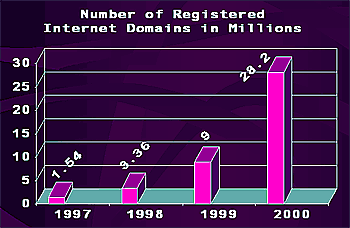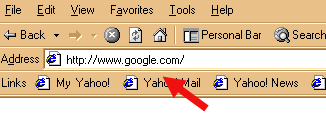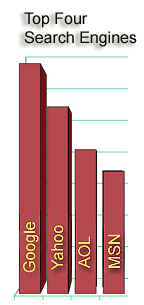The Internet |
|
The Internet Part IV
With millions of messages and Internet pages traversing the Internet at any give time, how does all that traffic know where it's supposed to end up? Just as you have a unique telephone number, each computer on the Internet has a unique IP address. For example, one of the IP addresses for CyberCollege.com used to be 64.77.120.3. So why not just type in 64.77.120.3. at the top of your browser instead of CyberCollege.com? Actually, when these numbers were associated with CyberCollege.com, you could, and this saves computers (that you will recall only understand the language of "numbers") from having to translate "CyberCollege.com" into "64.77.120.3." But, there are two problems with just using numbers. First, for most of us, having to remember 64.77.120.3 is much more difficult than remembering CyberCollege.com. Second, the IP address for CyberCollege.com will change if the owner of this domain decides to switch web-hosting companies. If this happens--and it has several times in the history of this domain--these numbers will suddenly point to either the wrong domain (web site)--or to no site at all. This would be like suddenly changing your phone and not being able to tell anyone your new number. For telephone numbers we have phone books; for the Internet we have domain name servers, or special computers that store the IP addresses for every domain name. Unlike your phone book, these domain name server (DNS) computer files are updated on a daily basis. So that this critical information won't just reside in one place, most large companies, ISPs, and universities maintain their own DNS files to map (translate) host names into IP addresses. Actually, there are many more steps involved in managing IP addresses, but this explanation provides a basic idea.
Some of these domains are "parked," meaning that the people have registered the domain name (primarily to lay claim to and hold the name) but they have not put up an active web site. |
|
Domain
names such as Yahoo.com, PBS.org, or Harvard.edu are Domain names generally consist of a maximum of 26 characters that can be in the form of either letters or numbers. There can be hyphens to connect words, but there can't be any empty spaces in the name. You can't use an underline character, or begin or end the name with a dash. Names aren't case sensitive, so SampleName.com is the same as samplename.com. There are some domain name registrars that permit 64 characters, but some browsers can't handle this many letters. The domain name suffixes used in the United States are primarily "com," (as in Yahoo.com), "org," "edu," "net," "gov," and "mil." The "com" suffix is typically attached to commercial sites, the "org" suffix to nonprofit organizations, "edu" to educational institutions, "net" to Internet service providers, "gov" to government agencies, and "mil" to military installations. Having said that, it should be noted that there are many exceptions. With
the most recent
Since the original domain suffixes were initiated, millions of domain names have been registered (especially with the .com suffix). This has resulted in a shortage of possible new names.
To open the door to additional domain names, new suffixes have been added or proposed. Recently, the biz, .info, .name, .pro, .aero, .museum, and .coop suffixes were added. This chart lists the eight most popular domain suffixes as 2004. Other counties typically use suffixes to identify their country. For example, "CA" indicates Canada, "DE" Germany, and "SE" Sweden. In 2001 there were more than 240 two-digit country codes ranging from "AE" (the United Arab Emirates) to "VN" (Vietnam). Some countries allow users in other countries to register domains using their country's suffix (and derive revenue from this). And example is ".tv," now being used by some U.S. television stations. In
addition to being associated with a This obviously creates problems for people happen to have last names such as "Disney," or "McDonald," who would like to have a domain or a business centered on their own name. Many cases of trademark infringement involving such disputes are now in the courts.
Once you discover a URL (a site) that you think you will want return to you can "bookmark" it or add it to your "favorites" list. With the Netscape browser you initiate this with the right button on your mouse; with Internet Explorer you click on "favorites" and then "add." Different browsers, and even different versions of browsers, handle this differently. Once you add a bookmark or save a URL in "favorites," you don't have to try to remember the URL. It's even possible to organize these under different categories--a procedure that comes in handy if you end up wanting to save a few dozen URLs. Although this procedure generally means you have to use the same computer all the time, it's possible to save your bookmarks or favorites to a floppy disk, and then load them onto another computer.
With
Since most people look for information on the Internet by using one of these search engines, there is great competition to be listed at one of these sites. By being listed among the top 10 or so entries on a search (which is about as far down as most people search) businesses have a much greater chance of selling products and services. Some search sites charge businesses for either being placed at or near the top of the listings, or having advertisements for their business appear when a user types in relevant key terms. When a search is made on basic terms, searches can result in thousands--even hundreds of thousands--of Internet pages. Therefore you may want to use some of the search engine's techniques for narrowing down your searches to a manageable number. With this module we come to the end of the film and electronic media modules. In the next module we start the story of the major print media. |

 Since
1997, the number of registered Internet domains has grown more than
18-fold.
Since
1997, the number of registered Internet domains has grown more than
18-fold. unique--they are licensed to an organization that, for a fee,
has an exclusive right to use them for a period of time, after
which the holder can renew their rights.
unique--they are licensed to an organization that, for a fee,
has an exclusive right to use them for a period of time, after
which the holder can renew their rights. Internet Explorer browser you do not have to type in the full URL. In
the case of the search engine google.com, for example, you can simply
type in "Google" and hold down the control key (with Windows)
and hit return, and the full address will automatically be filled in,
as shown above.
Internet Explorer browser you do not have to type in the full URL. In
the case of the search engine google.com, for example, you can simply
type in "Google" and hold down the control key (with Windows)
and hit return, and the full address will automatically be filled in,
as shown above. domain,
many names, such as IBM™,
Microsoft™, CyberCollege™, and InternetCampus™ are registered
trademarks. This means that only the holder of the trademark
can legally use them.
domain,
many names, such as IBM™,
Microsoft™, CyberCollege™, and InternetCampus™ are registered
trademarks. This means that only the holder of the trademark
can legally use them. billions of pages of information on the Internet it would be impossible
to locate anything without search engines. The 2003 ranking of top four
search engines are shown below. Beyond these four there are numerous
other much smaller search engines that fill out the remaining six percent
of the total.
billions of pages of information on the Internet it would be impossible
to locate anything without search engines. The 2003 ranking of top four
search engines are shown below. Beyond these four there are numerous
other much smaller search engines that fill out the remaining six percent
of the total.